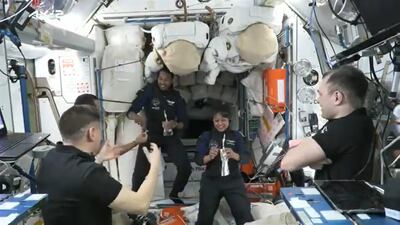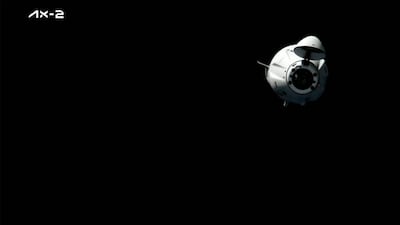Two Saudi astronauts who arrived at the International Space Station on Monday are learning how to adapt to life in orbit – including how to prepare meals and take care of personal hygiene.
Rayyanah Barnawi, the first Arab woman to go on a space mission, and Ali Al Qarni are on the orbiting outpost for an eight-day private trip, with a return to Earth expected on May 30.
They were welcomed aboard the station by the UAE's Sultan Al Neyadi, who is there on a six-month mission led by Nasa.
“The private quartet consisting of commander Peggy Whitson, pilot John Shoffner and mission specialists Ali Al Qarni and Rayyanah Barnawi spent Tuesday getting familiar with station operations,” Nasa said on Tuesday.
“They practised preparing food and drinks, conducting hygiene practices, performing safety procedures and operating lab equipment while getting used to living in space.”
How do they keep clean?
Water does not flow in a zero-gravity environment, so astronauts shower and brush their teeth differently.
This means installing a shower, tap or sink on the ISS would be pointless because water would float away in the form of droplets.
Instead, astronauts have to use wet towel containing body wash to clean themselves.
To wash their hair, they apply shampoo without water and wipe it off with a dry towel.
To brush their teeth, they squeeze small amounts of water through a straw to rinse and then swallow.
What do they eat?
Meals on the ISS have improved recently, thanks to an oven that was installed two years ago.
Astronauts have been baking cookies and using vegetables grown on the station as part of their diet.
But they mostly consume dehydrated food stored in packets. They add water to it or heat it in the oven, so it is ready to consume.
There are also some ready-to-eat items – including fruit, bread and nuts.
The two Saudi astronauts have taken dates and some traditional meals with them.
Staying safe
On Tuesday, the Saudi astronauts were briefed by Dr Al Neyadi and his colleagues on their roles and responsibilities in the event of an emergency.
The station is a bit more crowded now, with 11 astronauts aboard.
The entire crew went over safety gear, such as fire extinguishers and portable breathing gear, followed escape routes, and co-ordinated communications with mission controllers in response to fire and ammonia and pressure leaks.
How will they spend the rest of their time?
Ms Barnawi and Mr Al Qarni have 14 experiments sent by Saudi researchers that they will conduct.
These include science investigations that involve cancer stem cell research and testing cloud seeding techniques.
They will also take photographs from the cupola – an observatory on the station that astronauts use to monitor arriving spacecraft and take images of Earth.
Dr Al Neyadi has been taking photographs many Arab countries – including the UAE, Saudi Arabia, Bahrain and Oman from space.











